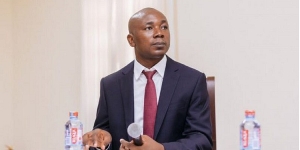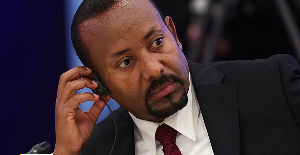Business News of Wednesday, 6 April 2016
Source: thefinderonline.com
IMF bailout yields positive results – Mona Quartey
Deputy Minister of Finance, Mrs Mona Quartey says the three-year International Monetary Fund (IMF)
Bailout programme signed one year ago is yielding positive results as the country has received over $500 million from development partners within the one-year period.
In addition, she said, the fund programme has also boosted investor confidence in the economy.
Mrs Quartey announced this at the Conference of Ministers at the ninth Joint Annual Meetings of the African Specialised Technical Committee Meeting of the Ministers of Finance, Monetary Affairs, Economic Planning and Integration and the United Nations Economic Commission for Africa Conference of African Ministers of Finance, Planning and Economic Development at Addis Ababa, Ethiopia.
With Ghana attaining the status of a lower middle-income country, sources of concessional funding - both from donors and development agencies - dropped significantly.
She said Ghana negotiated a bailout programme with the IMF that made a lot since it was based on home-grown policies.
As part of the programme, she stated that Ghana has successfully gone through two performance reviews with the IMF.
According to her, the implementation of the IMF programme, which has resulted in a fairly stabilised macro economy, has ensured that Ghana achieves good rates for Eurobonds, as well as taps into private equity markets.
She announced plans to raise funds through Diaspora bonds to Africans to undertake projects.
She announced that the wage bill has been reduced from 70% of tax revenue to 47% of tax revenue, which has created fiscal space through the use of technology to clear ghost names.
Mrs Quartey said the Ghana Integrated Financial Management Information System (GIFMIS), introduced by government, was working well to rationalise expenditure as part of the Public Financial Management.
It is estimated that the country’s huge infrastructure deficit requires sustained spending of at least US$2 billion per annum over a period 10 years.
Following increasing demand on the central government's scarce resources, Mrs Quartey said State Owned Enterprises (SOEs) would be empowered to borrow on their balance sheet for projects.
She explained that SOEs that cannot borrow on their balance sheets would be made to sign on lending agreements with Central Government, and as part of that process an escrow account would be created for these SOEs to lodge their revenue to be used to pay the loans.
She said Ghana has a deep money market and government intends tapping into pension funds and insurance companies using the book building approach to raise funds for development.
She stated that government, through fiscal discipline, has rationalised expenditure and at the same time increased tax revenue, which has created fiscal space.
The Deputy Finance Minister also said government intends to leverage on the Ghana Infrastructure Fund to borrow at good rates.
She announced plans to raise municipal bonds to provide cheap funds from the capital market to meet the ever-mounting infrastructure obligations of Metropolitan, Municipal and District Assemblies.
Mrs Quartey emphasised the importance of financing that lends itself to projects to be established, especially under Public-Private Partnerships.
Mrs Quartey outlined the four areas of Ghana Poverty Reduction Strategy ll (GPRS ll) for the period 2014-2017, and called for synergies of all the various Agenda 2063, the Sustainable Development Goals at national, regional and global levels.












